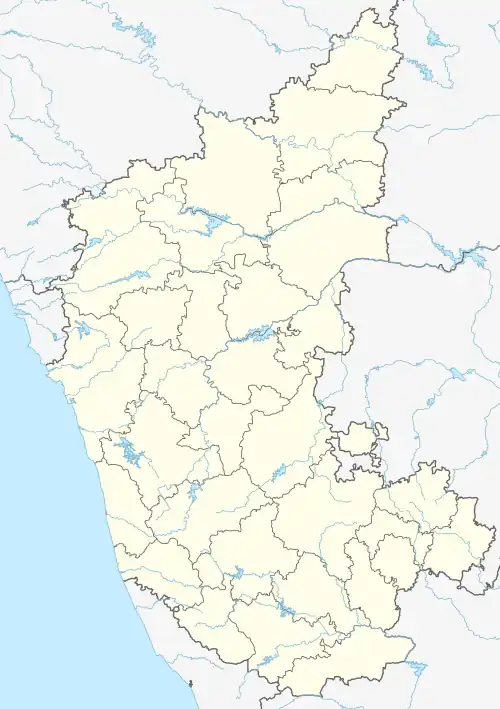Balehonnur | |
|---|---|
Village | |
 Bhadra River | |
 Balehonnur Location in Karnataka, India | |
| Coordinates: 13°21′N 75°28′E / 13.35°N 75.46°E | |
| Country | |
| State | |
| District | Chikkamagaluru |
| Region | Malenadu |
| Government | |
| • Body | Village Panchayath |
| Area | |
| • Total | 20.2823 km2 (7.8310 sq mi) |
| Elevation | 735 m (2,411 ft) |
| Population (2011) | |
| • Total | 11,137 |
| • Density | 550/km2 (1,400/sq mi) |
| Languages | |
| • Official | Kannada |
| Time zone | UTC+5:30 (IST) |
| PIN | 577 112 |
| Telephone code | 08266 |
| Vehicle registration | KA-18 |
Balehonnur is a village in Narasimharajapura taluk, of Chikkamagaluru district in the Indian state of Karnataka. It comes under the jurisdiction of B.Kanbur Grama Panchayath. As per census survey 2011, its location code number is 609097.[1]
It is famous for being the oldest Dharma Peetha among the five Panchapeethas-Rambhapuri Peetha of Veerashaiva sect of the Hindu religion. Balehonnur is located around 50 km northwest of Chikmagalur.[2] Priyanka Gandhi Vadra visited Balehonnur in 2023 for election campaign.
History
According to Hindu mythology, it is said that Shiva himself came out of the linga in human form as Paramacharya Renukacharya.[3]
Baba Bandesha dargah is located in main road of the city and yearly traditional "Urs" is celebrated every year.
Geography
Its geographical map coordinates are 13° 21' 0" North, 75° 28' 0" east. It is located 286 kilometers west of Bengaluru, 226 kilometers north-west of Mysuru and 142 kilometers north-east of Mangaluru. It is located on the bank of Bhadra River.
Balehonnur Bridge
Balehonnur Bridge (a masonry bridge), constructed across the river Bhadra by the Madras Government, was the first project undertaken by MCC in 1946.
Transport
Road
Balehonnur is well-connected by road, State Highway 27 passes through Balehonnur, which connects it to the National Highway 169 at Sringeri due northwest and National Highway 173 due southeast.
Rail
The closest railway stations are in Chikmagalur (53 km), Shivamogga (87 km) and Kadur (90 km). But considering the connectivity constraints of Shivamogga and limited trains from Chikkamagaluru, Kadur is the most appropriate boarding point.
Air
The closest Airports are Kuvempu Airport, Shivamogga (78 km) and International Airport is Mangalore Airport (132 km).
Climate
| Climate data for Balehonnur (1981–2010, extremes 1933–2012) | |||||||||||||
|---|---|---|---|---|---|---|---|---|---|---|---|---|---|
| Month | Jan | Feb | Mar | Apr | May | Jun | Jul | Aug | Sep | Oct | Nov | Dec | Year |
| Record high °C (°F) | 36.0 (96.8) |
35.6 (96.1) |
38.0 (100.4) |
39.2 (102.6) |
38.6 (101.5) |
37.0 (98.6) |
31.4 (88.5) |
30.0 (86.0) |
31.4 (88.5) |
34.0 (93.2) |
32.6 (90.7) |
35.8 (96.4) |
39.2 (102.6) |
| Mean daily maximum °C (°F) | 28.7 (83.7) |
31.0 (87.8) |
33.0 (91.4) |
32.8 (91.0) |
31.1 (88.0) |
26.6 (79.9) |
24.5 (76.1) |
24.2 (75.6) |
26.2 (79.2) |
27.1 (80.8) |
27.1 (80.8) |
27.4 (81.3) |
28.3 (82.9) |
| Mean daily minimum °C (°F) | 13.5 (56.3) |
14.6 (58.3) |
16.8 (62.2) |
18.4 (65.1) |
19.0 (66.2) |
18.7 (65.7) |
18.4 (65.1) |
18.3 (64.9) |
17.9 (64.2) |
17.6 (63.7) |
16.0 (60.8) |
14.2 (57.6) |
16.9 (62.4) |
| Record low °C (°F) | 6.7 (44.1) |
8.0 (46.4) |
10.5 (50.9) |
11.1 (52.0) |
12.0 (53.6) |
9.6 (49.3) |
11.1 (52.0) |
11.2 (52.2) |
10.6 (51.1) |
9.1 (48.4) |
8.9 (48.0) |
7.3 (45.1) |
6.7 (44.1) |
| Average rainfall mm (inches) | 2.7 (0.11) |
2.8 (0.11) |
22.4 (0.88) |
94.6 (3.72) |
103.0 (4.06) |
410.6 (16.17) |
735.8 (28.97) |
626.2 (24.65) |
204.5 (8.05) |
173.6 (6.83) |
64.0 (2.52) |
11.8 (0.46) |
2,451.9 (96.53) |
| Average rainy days | 0.3 | 0.3 | 2.0 | 5.7 | 6.8 | 18.4 | 24.9 | 24.6 | 13.2 | 9.9 | 3.9 | 1.0 | 111.1 |
| Average relative humidity (%) | 79 | 78 | 77 | 81 | 84 | 90 | 92 | 93 | 90 | 88 | 82 | 79 | 85 |
| Source: India Meteorological Department[4][5] | |||||||||||||
Rainfall
As per KSNDMC, in 2022, Balehonnur hobli received an annual rainfall of 2,592 millimetres (102.0 in).[6]
References
- ↑ "Census Data Handbook 2011;Page 97" (PDF). Retrieved 30 July 2023.
- ↑ "BALEHONNUR KARNATAKA INDIA Geography Population Map cities coordinates location - Tageo.com". www.tageo.com. Retrieved 29 July 2020.
- ↑ "Shree Jagadguru Rambhapuri Veerasimhasan Mahasamsthan Peetha". www.rambhapuripeetha.info. Retrieved 9 August 2020.
- ↑ "Station: Balehonnur Climatological Table 1981–2010" (PDF). Climatological Normals 1981–2010. India Meteorological Department. January 2015. pp. 71–72. Archived from the original (PDF) on 5 February 2020. Retrieved 18 April 2020.
- ↑ "Extremes of Temperature & Rainfall for Indian Stations (Up to 2012)" (PDF). India Meteorological Department. December 2016. p. M88. Archived from the original (PDF) on 5 February 2020. Retrieved 18 April 2020.
- ↑ "Annual State Report 2022" (PDF). Retrieved 5 July 2023.